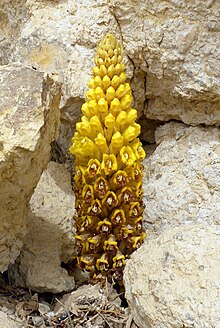Cistanche tubulosa is a desert heterotrophic species in the genus Cistanche. It lacks chlorophyll and obtains nutrients and water from the host plants whose roots it parasitizes.
| Cistanche tubulosa | |
|---|---|

| |
| Cistanche tubulosa (broomrape in Hamakhtesh Hagadol, Negev, southern Israel) | |
| Scientific classification | |
| Kingdom: | Plantae |
| Clade: | Tracheophytes |
| Clade: | Angiosperms |
| Clade: | Eudicots |
| Clade: | Asterids |
| Order: | Lamiales |
| Family: | Orobanchaceae |
| Genus: | Cistanche |
| Species: | C. tubulosa
|
| Binomial name | |
| Cistanche tubulosa (Schrenk) Hook.f.
| |
Uses
editThe plant is grown in the Taklamakan Desert, and is traditionally used for medicines and foods in China.[1]
The main sources of the Chinese herbal medicine cistanche (Chinese: 肉苁蓉, pinyin ròucōngróng) are Cistanche salsa and Cistanche deserticola, although it may also be obtained from C. tubulosa. The drug, known in Chinese as suosuo dayun, is collected in spring before sprouting, by slicing the stems of the plant.
Pharmacology
editEchinacoside and acteoside has been found in Cistanche tubulosa[2]
References
edit- ^ Shimoda, H; Tanaka, J; Takahara, Y; Takemoto, K; Shan, SJ; Su, MH (2009). "The hypocholesterolemic effects of Cistanche tubulosa extract, a Chinese traditional crude medicine, in mice". Am J Chin Med. 37 (6): 1125–1138. doi:10.1142/S0192415X09007545. PMID 19938221.
- ^ Xie, Chunyan; Xu, Xinjun; Liu, Qundi; Xie, Zhisheng; Yang, Mei; Huang, Jieyun; Yang, Depo (2012). "ISOLATION AND PURIFICATION OF ECHINACOSIDE AND ACTEOSIDE FROM CISTANCHE TUBULOSA (SCHRENK) WIGHT BY HIGH-SPEED COUNTER-CURRENT CHROMATOGRAPHY". Journal of Liquid Chromatography & Related Technologies. 35 (18): 2602–2609. doi:10.1080/10826076.2011.637270. ISSN 1082-6076.
External links
edit- Data related to Cistanche tubulosa at Wikispecies
- Media related to Cistanche tubulosa at Wikimedia Commons